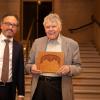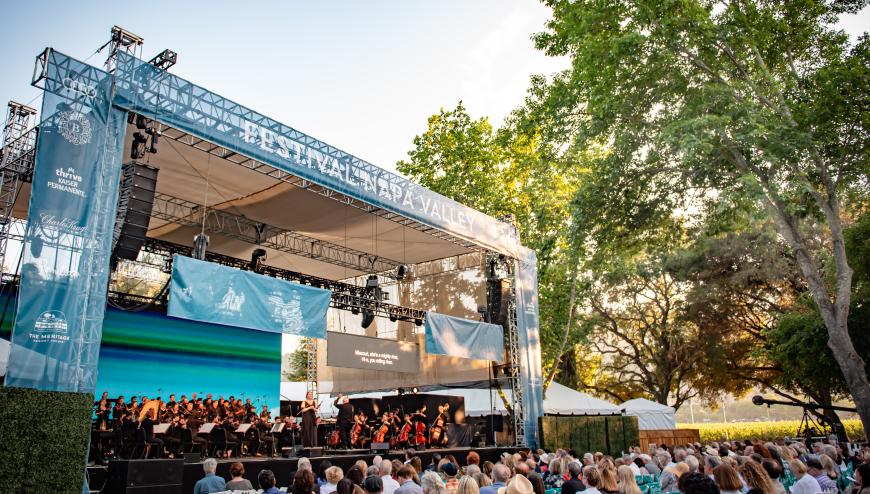
Like wine, the quality of an artist’s work is not determined by age, nor is the vigor of an audience. This was evident at Festival Napa Valley on Thursday, July 18. The day began with a book launch for 90-year-old Gordon Getty and concluded with a showcase of vocalists mostly in their 20s, with all events attended by a multigenerational audience flocking to wine country from all over this country and several continents.
The celebration of Getty’s Upon a Day: Verse and Other Writings (Authority Publishing) was staged in the morning on the mezzanine of CIA at Copia in downtown Napa. Getty is best known to the festival as a longtime contributor of music and financial support, and attendees at the book event included friends and acquaintances. Upon a Day features author’s notes and librettos from four of Getty’s operas and lyrics from choral works and song cycles. Getty cultivates and lays out his elegantly worded lines much as the benign climate of the Napa Valley fosters carefully arrayed rows of succulent grapes.
Not long after obtaining the book and the author’s autograph, folks headed down the hall to the Ecolab Theatre for a program of art songs by soprano Lisa Delan, pianist Kevin Korth, and clarinetist David Barnett.
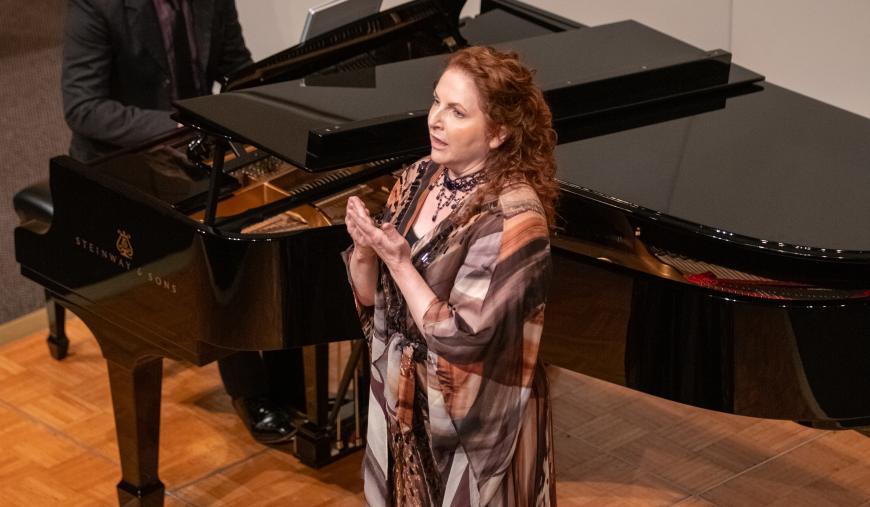
Delan could rightly be dubbed a Renaissance woman. In addition to her singing career, she’s director of Rork Music (named for Getty’s mother, Ann Rork) and of the Ann and Gordon Getty Foundation. For the afternoon concert’s opening offering, five of Louis Spohr’s Six German Songs, Delan provided new translations. Dressed in a beguiling floor-length vintage gown by Roberto Cavalli, she conveyed the drama of lieder with a richly brewed flow of sound, matching Spohr’s references to a Napa-like environment of birds in trees. Korth was lucid and forthright in accompaniment. Barnett, though he may have had reed challenges, was particularly affecting in “Wiegenlied” (Cradle song), placed physically and compositionally in intimate relation to the vocalist.
Carl Loewe’s Scottish Images featured clarinet and piano in a triptych of pastiches. The clarinet could have been more prominent in the matchup, perhaps with amplification.
Jake Heggie’s Three Folk Songs brought enticingly unexpected voicings to familiar tunes, the composer eliciting the psychodrama in “Barb’ry Allen,” the vocalist having us perceive the perspectives of both the fated characters and the empathetic narrator. With Heggie’s spare, wistful, and spot-on “He’s Gone Away,” Delan demonstrated the art of singing story, commanding the room with subtle motions of head and hands. For “The Leather-Winged Bat,” she placed hands on hips and affected a colloquial vocalization, impishly partnered by Korth.
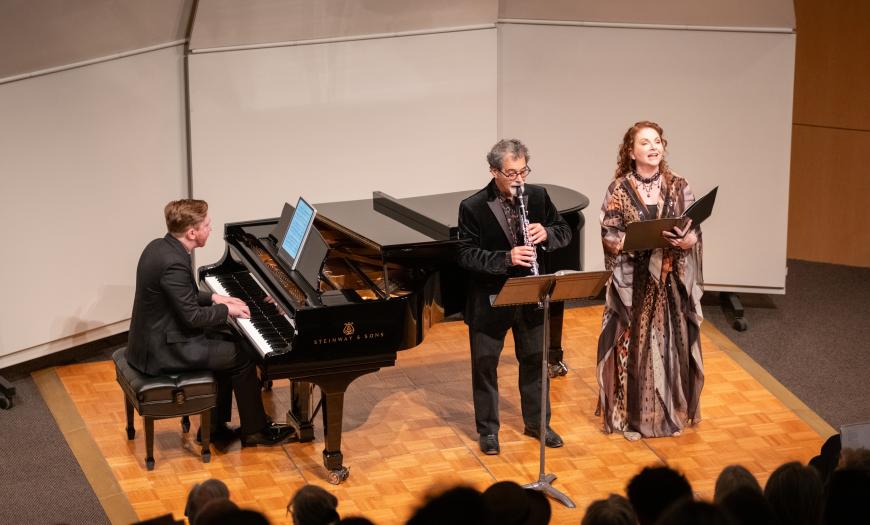
“Unlocked,” also composed by Heggie, counted both as a world premiere and the first time Delan, also a published poet, has sung her own verse. The words were difficult to make out, but the composition pleasantly evoked the music of Carlisle Floyd, ending with the accompaniment in blithe unison with the singer’s vocalese and humming.
In casual conversation at the book launch, Getty had bellwethered the evening’s opera concert by saying, “There’ll be a slew of young singers, and they’re all scary good!” He assessment was mostly right. The satisfyingly variegated program on the Festival Napa Valley Stage at the Charles Krug Winery showcased nine of the Manetti Shrem Opera Fellows in selections from Mozart to Richard Strauss to the world premiere of Getty’s complete Old Man Trilogy.
An early highlight was the credibly ingenuous tenor Hongrui Ren as Rodolfo in La bohème, glowingly supported by Festival Orchestra Napa under the baton of Dana Sadava. Soprano Pelagia Pamel as Mimi was equally appealing but not as strong a singer as Ren.
The very different dynamics of Verdi’s Don Carlos paired bass Atticus Rego, an earnest and vulnerable Filippo, with bass Morgan-Andrew King, a scarily imperious Inquisitore. The power play was unavoidably evocative of election-year politics.
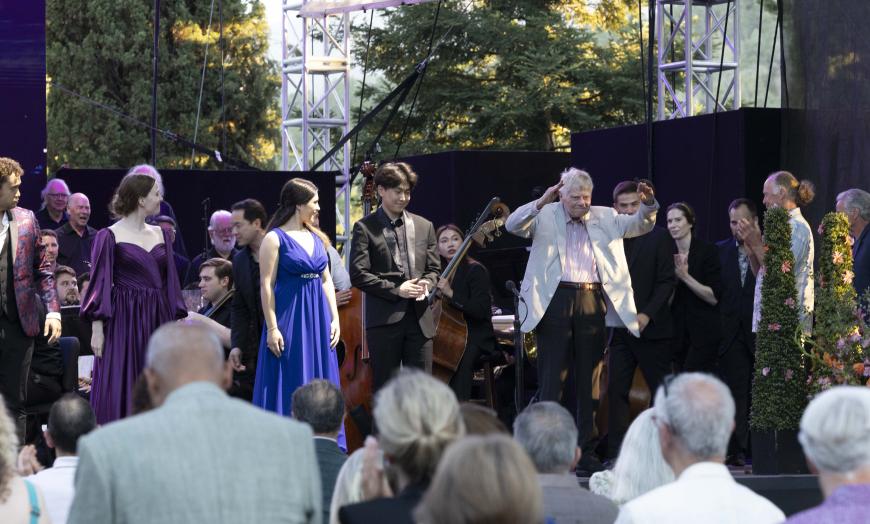
Several of the standout singers appeared later in the concert in roles reflective of their dramatic breadth: Ren a very different lover as the Duke in Rigoletto and Rego as the titular seducer in Don Giovanni, with King as his sardonic wingman, Leporello.
Soprano Stephanie Chee and mezzo-soprano Leah Finn made for a pretty pair of songstresses in the “Sous le dôme épais” duet from Leo Delibes’ Lakmé, enhanced by a huge floral projection on the back of the stage and conducted with a light touch by Zach Salsburg-Frank. The piece fitted the blithe beckoning of a Silverado evening.
The skill of stage director Alek Shrader in making use of limited space and two onstage mics worked to particularly delightful effect in “Contro un cor che accende amore” from Rossini’s The Barber of Seville, in which Finn returned as a saucy, vibrant Rosina, deploying a mocking meta-approach and fine breath control. From the podium, Sadava advanced the charm and comedy skillfully.
Getty’s Old Man Trilogy gathers together three similarly themed verses set to music. The piece brought to the stage Festival Napa Valley Volti Chorale and conductor Ming Luke. “The Old Man in the Morning” elicited majestic vocal harmonies over a warmly wrought foundation of strings and harp.
For the oratorio-like “The Old Man in the Night,” Getty artfully works the different sections of the chorus, as well as the orchestra’s horns, woodwinds, and mallet percussion. The urgent kineticism of the strings at times evoked Verdi. Lyrics were audible and elegantly sung.
“The Old Man in the Snow” was written by Getty in 2020 in memory of his wife. It calls back affectingly to earlier parts of the triptych, with the composer’s trademark eddies and clarion calls musing over a naturalistic soundscape, all coordinated empathetically by Luke. “What we who knew and saw may stay to teach,” the chorale sang, “to strangers in the speech and song of men.” Anthemic, the music raised goose bumps appropriate to the composer’s sentiment and to the approaching chill of Napa dusk.
The same sort of midsummer magic summoned all nine singers back to the stage for a finale of “Make Our Garden Grow” from Leonard Bernstein’s Candide. Tenor Sid Chand warmed hearts and ears in the title role, with soprano Chloe Boelter a powerfully appealing Cunegonde, their peers joining them in celebrating the splendor of life’s basic imperatives. We can expect that Napa will persist in making its grapes grow and bringing us beautiful music among its vineyards in summers to come.



